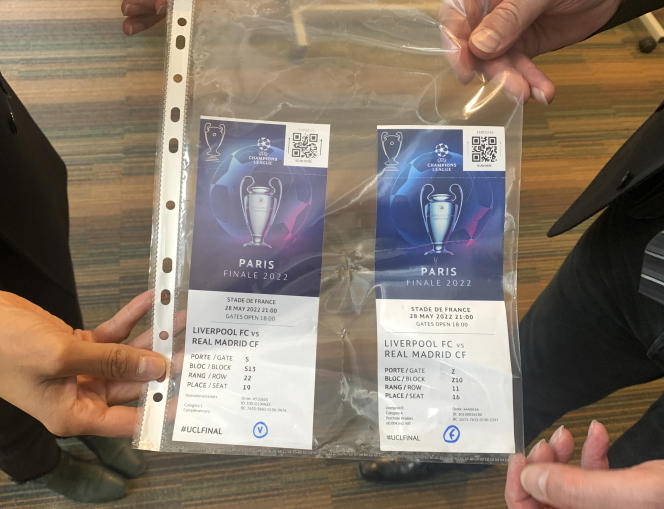Gérald Darmanin persists and signs: those responsible for the scenes of chaos on Saturday, May 28, near the Stade de France, shortly before the kick-off of the Champions League football final between Real Madrid and Liverpool, are the English. On Monday, during a press conference at the Ministry of Sports, the Minister of the Interior added to these accusations: “30,000 to 40,000 Liverpool supporters”, a figure confirmed by the Union of European Football Associations (UEFA ) according to Beauvau, would have found themselves “either without a ticket, or with falsified tickets” at the entrance gates of the Dionysian enclosure.
For Gérald Darmanin, “a massive, industrial and organized fraud of counterfeit notes” coming “from the other side of the Channel” would be the “root evil” of the malfunctions which postponed the kick-off of the match. Seven out of ten Reds supporters would have presented themselves at the first screening checks with falsified tickets – often at their expense –, argues the minister, who relies on the figures of the stewards. Up to 2,600 “unvalidated” tickets were counted at the gates of the enclosure, “even though [their holders] had passed the first screening”.
“One hundred and twenty thousand supporters wanted to enter an 80,000 seat stadium, hence the magnitude of the push at the gates,” adds a source familiar with the matter. But are these figures put forward by the French authorities and UEFA credible, when several tens of thousands of English supporters gathered on Saturday in the fan-zone installed in the Cours de Vincennes and planned to accommodate 44,000 people?
Disputed figures
Under pressure from Liverpool, UEFA had authorized the printing of 22,000 tickets for English fans, while Real Madrid had only received an envelope of 5,000 tickets in paper format, which were not printed. object of any falsification.
If UEFA had warned the two clubs about the problem of fraudulent resale and the black market, the European body had, according to it, never been confronted with the presence of such a large number of supporters without ticket, despite a precedent in Madrid, during the 2019 edition of the Champions League final which opposed Liverpool, already, to the London club Tottenham. Ronan Evain, executive director of the Football Supporters Europe network and present at the Stade de France on Saturday evening, disputes the figures put forward by the authorities, speaking of a marginal phenomenon.
On Monday, the Minister of Sports and the Olympic and Paralympic Games, Amélie Oudéa-Castéra, called on UEFA to launch an investigation to understand the extent of the fraud. Officially, the boss of European football shows his concern to make his self-criticism and to analyze the dysfunctions observed in terms of ticketing. UEFA also announced on Monday the opening of an “independent” investigation into this fiasco, led by Portuguese parliamentarian and former Minister of Education, Youth and Sport Tiago Brandao Rodrigues (2015- 2022). The findings and recommendations of his report will be “made public” in the coming months.
In Nyon, at the headquarters of UEFA, some executives are ironic about the desire of the French authorities “to clear themselves” or “to blame the English” or the organizing bodies of the match. On Monday, Prime Minister Boris Johnson’s spokesman said he was “extremely disappointed” with the treatment of Liverpool supporters.
For its part, the French Football Federation (FFF), co-organizer of the match, did not wish to comment on these suspicions of “massive fraud”, which prompted the prefect of police of Paris, Didier Lallement to seize the prosecutor Bobigny, leading to the opening of an investigation entrusted to the sub-directorate of economic and financial affairs of the Prefecture of police.
The FFF, whose general manager, Florence Hardouin, participated in Monday’s interministerial meeting, was on Saturday responsible for private security agents for filtering and pre-filtering and for transporting the coaches of the two teams’ supporters, including a third of the 160 vehicles chartered to transport the Scousers were actually used.
“Protocol failures”
Faced with the incidents at the Stade de France, the senator (Les Républicains) of Isère Michel Savin called on Mr. Darmanin not to “underestimate the shortcomings of the security protocol put in place by the administration”. Because the fiasco of Saturday is also partly due to the poor organization of the French authorities, denounced the next day by the British. “Horrible security and a life-threatening organization,” said West Liverpool MP Ian Byrne, who admitted to having had “one of the worst experiences of [his] life”.
The strike on the RER B – announced since the start of the week – forced the majority of spectators to use the RER D, encouraged to do so at Châtelet station by messages from the RATP and the public authorities. Except that when leaving the RER D, the route to arrive at the Stade de France takes much narrower lanes than those of the RER B, in particular the passage under the A86 bridge, where a bottleneck formed on Saturday. strangulation. Some 40,000 Reds fans waited sometimes more than three hours before the start of the match to pass the first pre-filters, where only about twenty agents were in charge of checking the tickets.
Faced with the flow of supporters, Didier Lallement decided to lift the pre-filtering, prelude to overflows (attempts to intrusion, indiscriminate use of tear gas by the police, etc.) then observed around the stadium. “Nobody could have foreseen the 30,000 to 40,000 additional spectators who showed up at the Stade de France with tickets that weren’t real,” said Mr. Darmanin.
Amélie Oudéa-Castéra acknowledged that “we need to improve on certain aspects of flow management out of transport” in the run-up to the 2024 Paris Olympics. An Elysian source confirmed on Monday that they were considering the possibility of closing the road network in such an unpredictable situation. “Obviously, we are not quite ready [au postponement] on the RER D”, acknowledged the Minister of the Interior.

















